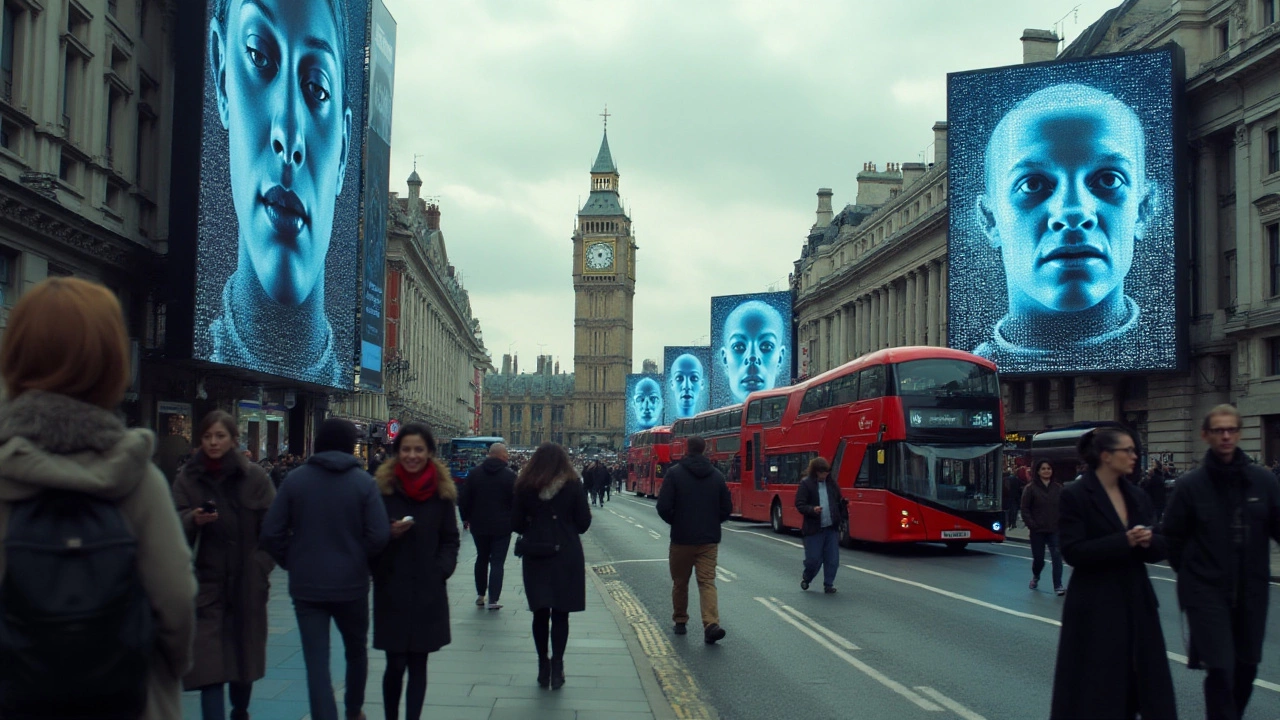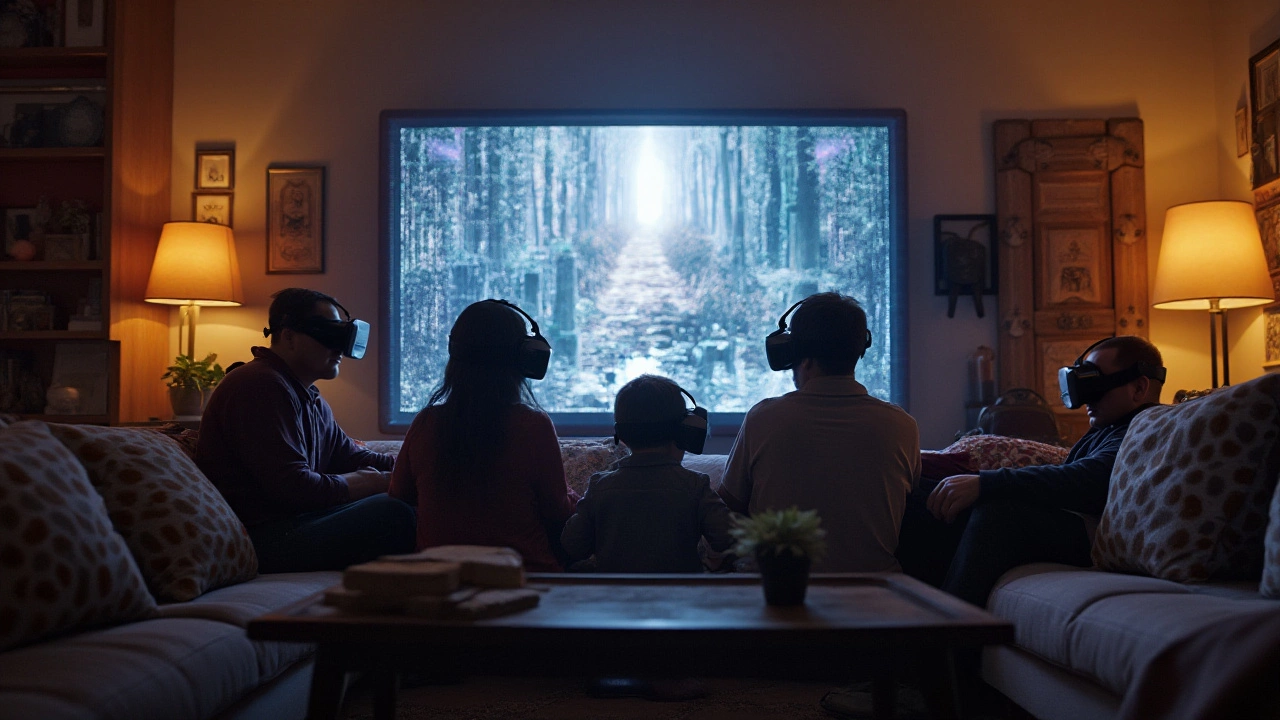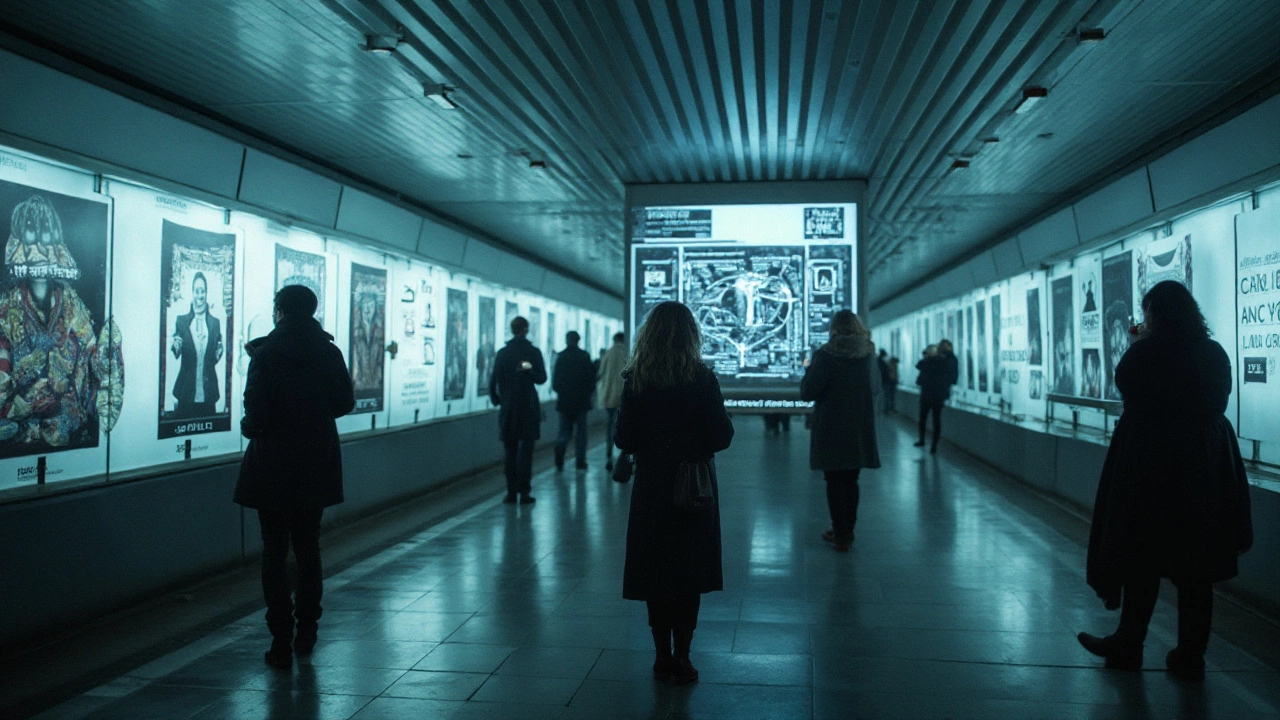The Meaning Behind 'Black Mirror': Exploring Its Themes

'Black Mirror' is an anthology series that has captivated audiences with its intense and often unsettling explorations of technology's impact on modern life. The show's creators crafted each episode to stand alone, presenting a different scenario that challenges viewers to reflect on their own relationship with technology.
By placing familiar elements of our everyday lives into unfamiliar and extreme contexts, 'Black Mirror' effectively holds up a mirror to society, encouraging us to question the trajectory of our technological advancements. Its use of dystopian scenarios opens discussions about the ethical implications of technology in our daily interactions.
Through compelling storytelling, the series does more than entertain; it prompts deep contemplation about the direction in which we're headed. It serves as both a warning and a reflection, making us think twice about our digital dependencies.
- Origins and Concept of 'Black Mirror'
- Technological Themes and Dystopian Settings
- Social Commentary and Human Nature
- Impact on Viewers and Society
Origins and Concept of 'Black Mirror'
The production of 'Black Mirror' started with a compelling desire to explore our increasingly intricate relationship with technology. The show's creator, Charlie Brooker, envisioned a series that would delve into the dark corners of our tech-centric lives, inspired by the rapid digital transformations reshaping society. His concept was not just to craft thrilling tales, but to make people think deeply about the implications of technology they so readily embrace. With its debut on Channel 4 in the United Kingdom in 2011, 'Black Mirror' quickly set itself apart from other series by its distinctly unsettling tone and thought-provoking plots. The title itself is a metaphor, referring to the cold, glossy screens of devices we surround ourselves with—televisions, phones, and computers—reflecting back a darker version of our world.
'Black Mirror' draws from the tradition of speculative fiction, much like 'The Twilight Zone', which Brooker has cited as an influence. Each episode presents a standalone narrative, often set in a dystopian reality that isn't so far removed from our own. This approach allows Brooker to craft varied stories without being constrained by a single timeline or setting, giving him the freedom to explore different aspects of the human-technology relationship. The series' brilliance lies in its ability to provide disturbing yet plausible insights into future possibilities, which are often just an extension of our current trends. Brooker has mentioned in interviews how the show aims to explore 'the way we live now—and the way we might be living in 10 minutes' time if we're clumsy.'
What if a near-future seemed disturbingly like today? That was part of the initial pitch that helped get Black Mirror off the ground. - Charlie Brooker
The show's episodic format allows for an array of genres, from psychological horror to dark comedy, each achieved while maintaining a consistent thematic undertone. By drawing in talented directors and actors for each self-contained episode, 'Black Mirror' remains fresh and engaging, avoiding the pitfalls of repetitive storytelling. This format also means episodes can be more daring and creative, pushing boundaries in ways serialized television sometimes shies away from. The production quality is notably high, matching or exceeding many feature films, which helps to fully immerse the audience in its chilling speculative worlds. With social media and online platforms buzzing with theories and debates after each release, 'Black Mirror' has successfully positioned itself as not just entertainment, but a cultural touchstone that echoes societal anxieties around technological advancement, privacy, and human behavior.

Technological Themes and Dystopian Settings
One of the standout features of Black Mirror is its unique blend of technological themes interwoven with dystopian settings, creating a stark landscape that both fascinates and terrifies. Each episode is meticulously crafted to explore a specific technology or trend, projecting it into plausible futures that often appear just a step beyond our current reality. These scenarios force us to confront the darker aspects of our fascination with technology, highlighting how easily conveniences can morph into conflict. From social media rating systems taking over personal interactions to artificially intelligent beings gaining unnerving autonomy, the stories unfold in a world that's disturbingly close to ours.
The creators cleverly use dystopian elements to amplify these themes. By exaggerating the potential consequences of technological advancements, they capture the audience’s attention, making them reflect on their own tech dependencies. Such settings serve as fertile ground for commentary on pressing ethical issues, encouraging viewers to question not just how they use technology, but why and to what end. Episodes like "Nosedive," which involve a society driven by social ratings, cleverly mirror current social media culture, exaggerating its influence to highlight dependency and loss of genuine human connection.
In these imagined worlds, technology often becomes a character itself, acting both as a lubricant for societal mechanisms and as a potential undoer of its fabric. The blending of human life with digital augmentation becomes an undercurrent that runs throughout the series. For instance, in "San Junipero," the show explores the concept of digital afterlife, merging human consciousness with virtual spaces. This raises philosophical questions about identity and immortality that linger with the viewers long after the episode ends.
Statistics show that nearly every technological development depicted in Black Mirror has some root in reality, although taken to an extreme. This subtle relatability provides the backbone of its unsettling nature. According to a study by the Pew Research Center, approximately 85% of people express concern about potential privacy implications with current technology, underlining the show's relevance. By pushing these boundaries, Black Mirror transitions its stories from mere science fiction to a serious reflection on tech's role in shaping our future.
As viewers delve into these darkly imaginative episodes, they might find themselves pondering a quote from series creator Charlie Brooker: "Each story is a different reality, some more optimistic than others, but they all say something about where we are now." It's this clarity of vision that compels the audience to not only enjoy the speculative tales but to consider their real-world implications. This ability to envision and critique simultaneously elevates the series beyond typical entertainment into a commentary tool that's both illuminating and unsettling.

Social Commentary and Human Nature
In each episode of Black Mirror, viewers are invited into a world where technology meets the rawest forms of human emotion and behavior. The series stands as a powerful social commentary by unmasking the often hidden desires and fears within the human psyche. At its core, the show delves into the essence of what it means to be human in the age of rapid technological progression. By doing so, it encourages audiences to engage with pressing questions about our collective future and the ethical considerations of our choices.
One of the key components of this social commentary is the show's exploration of communication and connection in a digital age. In episodes like "Nosedive," where people rate each interaction, the series critiques how technology changes the perceptions and social fabric of human connections, elevating the idea of social approval to an extreme where it dictates every aspect of life. This amplified view of our current society encourages an introspection about our daily obsession with social media validation, which although not as formalized as in "Nosedive," can feel just as controlling. It sheds light on how the blend of technology with human social dynamics can either bridge or break real-life relationships, questioning whether this form of connection is genuinely fulfilling or is merely a distraction from true intimacy.
Another critical theme tackled by the show is the idea of privacy and surveillance, which is particularly evident in "The Entire History of You." This episode imagines a world where every moment of our lives is recorded and can be replayed at will, dissecting how such technology could affect trust in relationships. It uncovers the vulnerability humans have to mistrust and jealousy, painting a vivid picture of a society obsessed with the granular details of the past. This portrayal prompts viewers to examine their own boundaries on privacy and transparency in personal relationships, especially with how much of our lives are stored on digital platforms.
Moreover, 'Black Mirror' doesn't shy away from forecasting the implications of these societal shifts, often illustrating a cautionary tale about unchecked technological advancement. The series powerfully asserts that while technology holds the potential to enhance the human experience, it also brings forth dangerous possibilities. An interesting statistic reflecting this comes from a study suggesting that nearly 68% of people feel technology is advancing faster than our ability to understand it, creating a playground for speculative fiction creators like Charlie Brooker, the mind behind Black Mirror.
The show goes beyond mere caution, often questioning our inherent reliance on and addiction to technology. Episodes like "White Christmas" and "Playtest" delve into the human fear of isolation and the suspicions that can brew within our increasingly digitized world. This narrative direction critiques how modern conveniences can turn into psychological cages, trapping individuals in a cycle of dependency that might lead to unforeseen psychological consequences. "Technology is a double-edged sword," said Brooker in an interview. "It can tear us apart just as easily as it brings us closer together."
By weaving these themes through compelling storylines and relatable characters, Black Mirror enables viewers to confront not just their relationship with technology, but the fundamental elements of their humanity itself. This engagement with deep, impactful topics transforms what could easily be an entertaining series into a meaningful exploration of human nature and social evolution.

Impact on Viewers and Society
The television series Black Mirror has left an indelible mark on its audience by compelling viewers to grapple with uncomfortable scenarios about the future possibilities of technology. It has sparked a new wave of conversation about the ethical and social repercussions of our intense reliance on modern technology. It forces its audience to look inward, questioning how the pervasive nature of digitalization could potentially influence our personal freedoms, privacy, and even human rights. The show has amplified the conversation surrounding technological responsibility and foresight, urging both individuals and broader communities to consider the consequences of unchecked innovation.
One of the key pathways through which Black Mirror affects viewers is through its exciting and frequently chilling narratives that address what might come if we allow technology to evolve without addressing its pitfalls. People have found these narratives relatable because they often tether futuristic ideas with our current societal trends. With the constant development in artificial intelligence and surveillance technologies, many viewers see the episodes as plausible near-futures rather than distant science fiction scenarios. This has fostered an atmosphere where public engagement with technology ethics has matured, encouraging more informed discussions around data privacy and what it means to live in a tech-driven world.
The series has also initiated a broader societal impact, influencing creators, policymakers, and technologists alike to rethink their contributions to technology and media. Creatives in the television and film industry have recognized the innovative storytelling methods of Black Mirror, which has led to a new genre of speculative fiction that thrives on societal critique. Meanwhile, the tech industry, with its inherently rapid pace of advancement, has faced increased scrutiny. In several instances, technology giants and developers pay heed to Black Mirror's cautionary tales, ensuring their innovations consider ethical perspectives thoroughly. This cultural phenomenon can't be overstated as it continues to resonate within academic discussions and ethical debates about technological implementation.
Moreover, a study by the BFI identified that a significant portion of the show's audience not only watched it for entertainment but perceived it as a catalyst for introspection and change in social behavior. A survey highlighted that 70% of viewers felt that the series had influenced their real-life perspective on technology. Such shows with mass appeal have the potential to shape public discourse and even policy shifts by shining a light on potential dystopian outcomes of current technological trends, encouraging a responsible approach to future development.
Bryce Dallas Howard, after her role in the episode "Nosedive," remarked, "It's an essential viewing in today's digital age... it plants a seed of introspection that grows into our daily consciousness."
In society, Black Mirror also acts as a catalyst for educational initiatives. It has made its way into classrooms and lectures, where educators use episodes to discuss ethical dilemmas and societal consequences with students. This educational facet allows young minds to critically evaluate the relationship between humanity and technology from a well-rounded perspective. As such, Black Mirror continues to influence not only casual viewers but impacts cultural narratives, legislative dialogues, and educational curricula about technology by providing a fertile ground for critical thinking.





